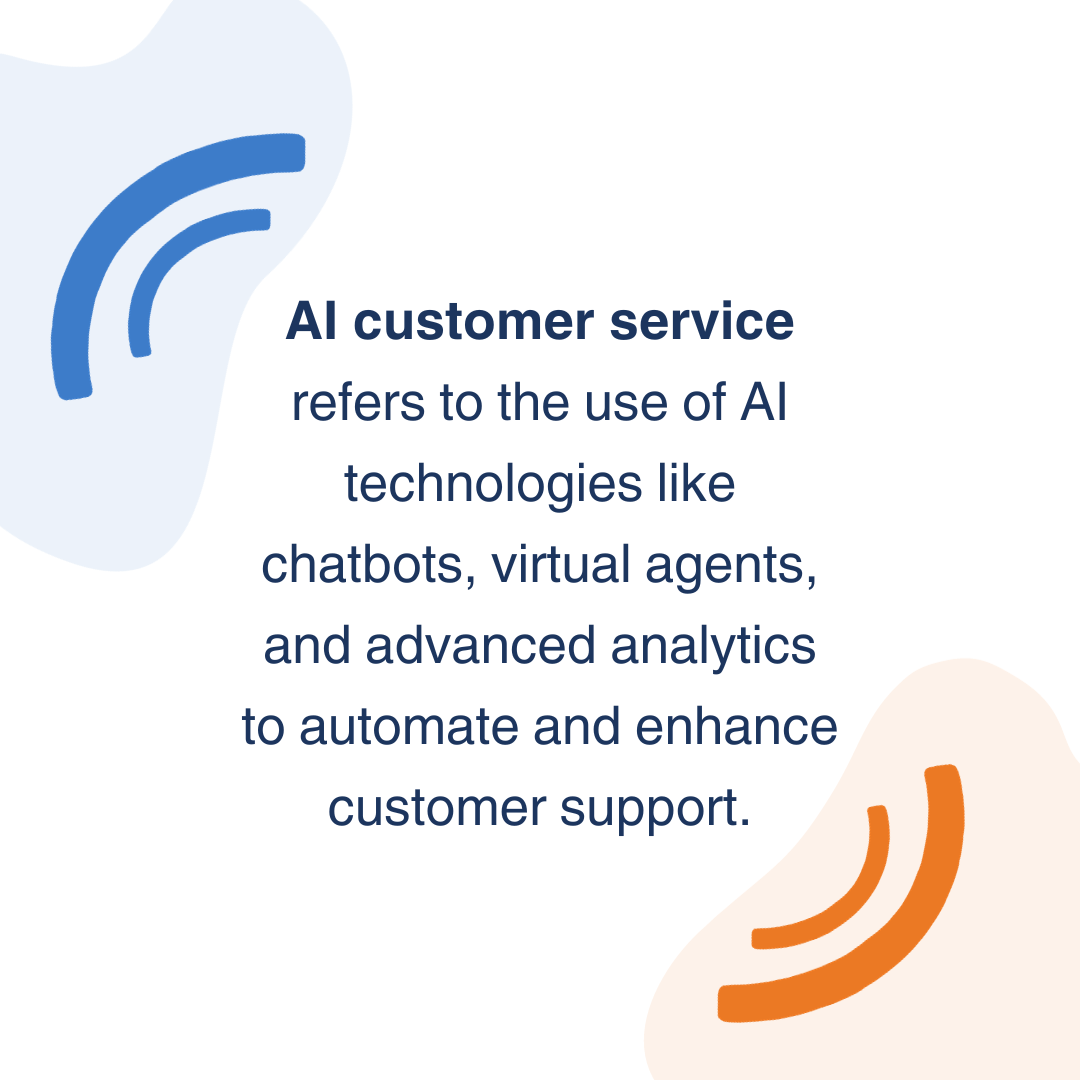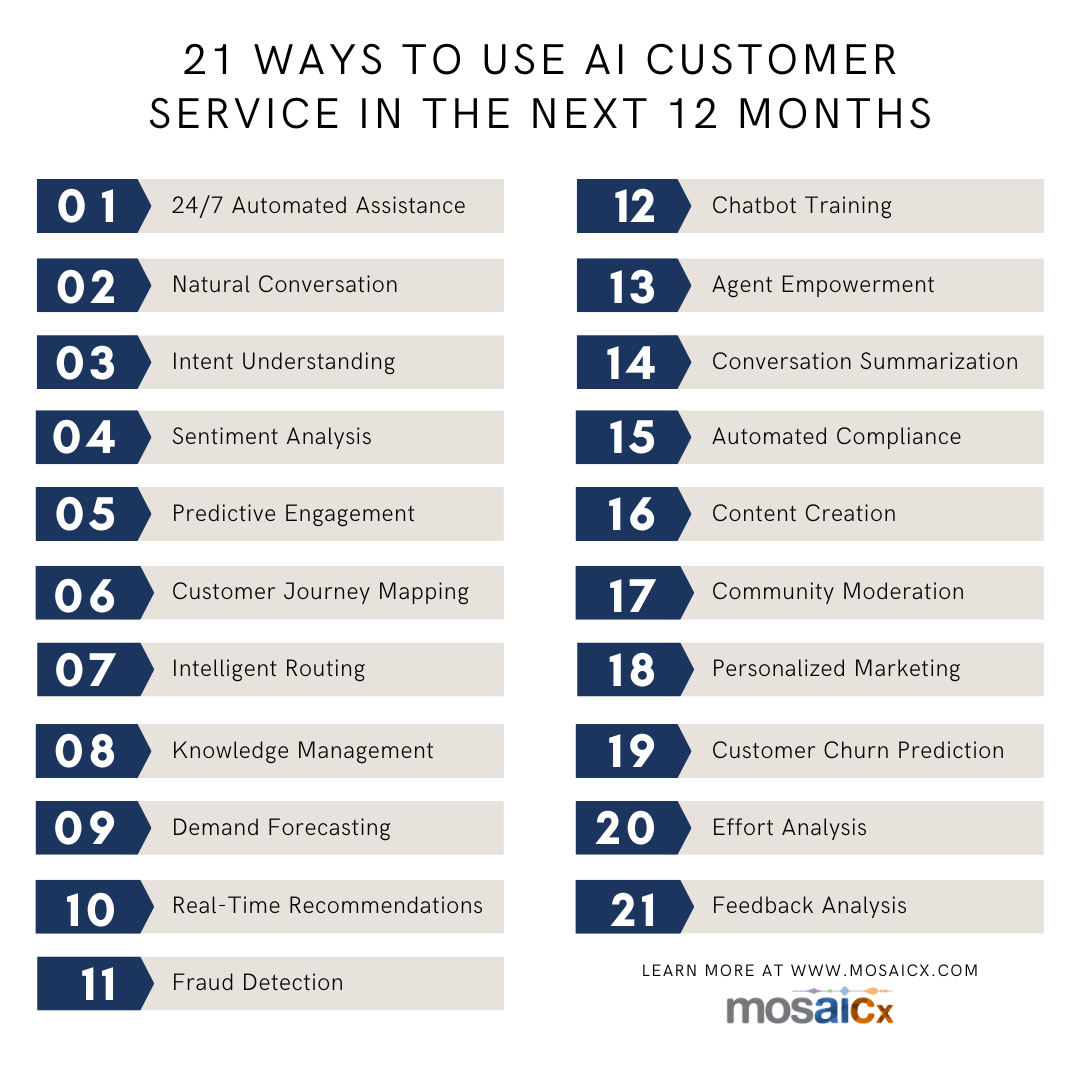12 Call Center Metrics You Should Be Using to Improve CX in 2025
Call center metrics are the most important performance indicators that monitor how effectively your call center is running. This includes anything...

In today's fast-paced and technology-driven world, there is a significant amount of interest in adding AI to customer service. Businesses are recognizing the potential of AI technologies like chatbots and virtual agents to automate and enhance customer support. These AI customer service solutions can handle routine inquiries, understand natural language, and provide personalized and contextual responses.
By incorporating AI into customer service, companies can improve efficiency, provide 24/7 availability, deliver fast and consistent answers, understand customers better, integrate seamlessly across channels, analyze interactions to identify issues, enable self-service options, integrate with back-end systems, provide personalized recommendations, and help with upselling and cross-selling.
The benefits of AI customer service are undeniable, as it allows businesses to provide faster, more efficient, and more personalized support to their customers, ultimately leading to higher customer satisfaction and loyalty.
Artificial intelligence (AI) is transforming customer service interactions. AI customer service refers to the use of AI technologies like chatbots, virtual agents, and advanced analytics to automate and enhance customer support.
At its most basic level, AI customer service involves using chatbots and virtual agents to handle routine customer inquiries. These bots can understand natural language, access knowledge bases for answers, and hold basic conversations with customers to address common questions and requests. This allows human agents to focus on more complex issues that require human nuance, empathy, and discretion.
More advanced AI customer service solutions utilize natural language processing, machine learning and sentiment analysis to understand conversations in greater depth. This allows the AI to interpret the intent and emotional state behind customer inquiries in order to provide more personalized and contextual responses. The AI can also improve over time through machine learning, becoming better able to understand diverse customer language, accent and phrasing variations.
AI is also being used to analyze customer data to detect trends, predict future behavior, and gain insights that improve customer experiences. For example, AI analytics of customer conversations, purchasing history, demographics and prior interactions can help companies understand individual customers better. This allows them to route inquiries intelligently, address issues proactively, and offer thoughtful recommendations tailored to each customer’s unique needs and preferences.
In summary, AI customer service encompasses a range of technologies aimed at automating basic service interactions, enhancing human-like conversational abilities, and providing data-driven insights to improve customer experiences on an individual level. The overarching goals are to boost customer satisfaction through fast, efficient and personalized service while reducing costs for the company.
 Benefits of AI Customer Service
Benefits of AI Customer ServiceAI customer service provides several important benefits:
One of the biggest benefits of AI customer service is improved efficiency. AI chatbots and virtual agents can handle high volumes of routine inquiries and requests around the clock without wait times, overhead costs or human fatigue. This allows human agents to focus on solving more complex issues, having deeper discussions that build relationships, or transferring to specialized departments to meet unique customer needs.
According to Gartner, organizations can deflect up to 70% of routine inquiries to AI chatbots, with some seeing even higher deflection rates above 90%. This dramatically reduces inquiries reaching human agents, resulting in sizable cost savings. The associated boosts in efficiency also lead to faster response times and improved customer satisfaction.
Another advantage of AI is its ability to serve customers anytime without staffing limitations or human fatigue. AI chatbots can engage with customers around the clock, ensuring prompt responses at any time of day. This results in a seamless, omnichannel customer experience across service channels.
Having automated assistants available 24/7 also enables companies to handle increased volumes of inquiries without exponentially growing staff. Sudden spikes in traffic due to sales, campaigns or unpredictable events can be managed without disruption. This reliability and scalability create a consistently positive customer experience.
AI customer service can provide customers with quick, accurate answers to common questions by accessing vast knowledge bases. Without relying on human lookup, AI assistants can respond consistently each time. This results in boosted customer satisfaction through prompt resolution.
Some advanced AI chatbots also collect conversational data over time to keep improving their knowledge bases. This allows them to handle an expanding range of customer inquiries and optimally adapt to evolving company products, services and policies. Their capabilities grow smarter through machine learning.
Sophisticated natural language processing enables advanced AI chatbots to understand conversational language, interpret intent and respond appropriately. Sentiment analysis can also assess the emotional state behind inquiries to gauge satisfaction or frustration. These capabilities create more natural, intuitive conversations.
In addition, AI tools can analyze customer data from past interactions to build rich customer profiles. This provides insights that help agents personalize engagements based on preferences and behaviors. By understanding customers better, AI can route inquiries appropriately and make thoughtful recommendations that delight customers.
Leading AI customer service platforms integrate seamlessly across multiple channels like phone, text, chat, and more. This enables continuous conversations with customers as they switch channels, with the AI retaining context about prior interactions. Customers enjoy omnichannel experiences tailored to their preferred ways of engaging.
While conversational AI may be used in a wide variety of channels, not all are useful for your business. Consider what channels your customers actually use today. A recent study shows that the majority of customers prefer to contact companies by voice and text message.
Cutting-edge AI has powerful capabilities to analyze unstructured customer interaction data, including sentiments, topics, trends and emerging issues. Natural language processing helps automatically tag and analyze text conversations to provide insights that would be impossible to gain manually.
These insights enable companies to identify common pain points, strengthen weak service areas and implement new improvements. Customer service teams gain unprecedented visibility into customer priorities and concerns. They can also benchmark performance over time.
For customers who prefer self-service, AI chatbots provide an automated alternative to resolve many routine issues independently without waiting for a live agent. AI assistants can handle tasks like checking order status, accessing account details, resetting passwords and addressing other frequently asked questions.
Empowering customers to self-serve through AI reduces call volumes so agents can focus on higher value engagements. It also boosts satisfaction among customers who prefer on-demand convenience. Offering self-service options caters to diverse customer preferences.
AI customer service solutions easily integrate with critical back-end systems using APIs. This enables AI chatbots to access real-time data from sources like CRM databases, billing systems, online accounts and more to serve customers.
For example, an AI assistant can check the status of an order by linking to order databases rather than asking the customer to provide details. The AI can also initiate actions through back-end integrations, like changing account details or processing refunds. This simplifies customer journeys.
Based on individual customer data and past interactions, advanced AI bots can make personalized product suggestions and recommendations that are highly relevant to each shopper. This creates more meaningful engagements that increase sales.
For example, the AI could recommend complementary products frequently purchased together, notify customers of sales on their favorite items or suggest new releases catered to their tastes. Personalized recommendations drive revenue while delighting loyal customers.
Similarly, AI tools are adept at identifying upsell and cross-sell opportunities during customer interactions. The AI assistant can suggest additional products and services tailored to the customer's needs, resulting in higher order values.
Providing contextually relevant offerings within conversations converts interest into sales while the customer is actively engaged. This results in a low-pressure, consultative customer experience rather than a disruptive sales pitch. AI makes upselling feel natural.
AI also augments human agents by providing them with the right information at the right time during customer engagements. Offering quick access to customer data, knowledge bases and insights enables agents to focus fully on the conversation.
With AI assistance, agents can spend less time looking up account details, order information or resources to answer basic questions. Instead they can have more impactful dialogues, strengthened by AI-generated cues, context and recommendations to enhance the discussion. This empowers human agents to provide excellent service.
AI analytics of customer interaction data can provide useful insights to optimize staffing levels and schedules. By assessing traffic volumes, peak hours, seasonal fluctuations and more, AI can help forecast needs and align human resources appropriately.
Schedule optimization reduces wait times and staffing costs by ensuring the right agents are available at the right times to meet demand. This balances productivity with positive customer experiences.
Deflecting common routine inquiries to AI chatbots also enables more specialization among human agents. With AI handling general requests, agents can develop deeper expertise in specialty areas like technical support, complex account management or order issues.
Routing inquiries to the most qualified agents based on AI assessment of issue complexity and required skills increases first contact resolution. Specialization improves customer satisfaction. AI enables this level of optimization.
AI customer service solutions generate volumes of data from customer engagements that would be impossible to collect manually. This data powers insights through analytics.
With data-driven real-time visibility into customer priorities, pain points and emerging trends, companies can continuously refine strategies, allocate resources and implement changes to optimize service quality. AI enables fact-based service improvements.
Cloud-based AI solutions can scale seamlessly and cost effectively to handle spikes in traffic. Rather than adding more human staff to manage seasonality or growth, additional AI capacity can be deployed on demand.
For example, e-commerce companies can scale AI chatbots to handle order inquiries that multiply during peak sales days. The extra capacity can then be reduced once the rush passes. This level of fluid scalability supports business growth without service disruptions.

In summary, AI customer service provides significant benefits in terms of efficiency, availability, speed, personalization, integration, analytics, automation and optimization. AI augments human agents while also empowering self-service options. The data-driven, scalable capabilities elevate customer experiences while reducing costs. AI is becoming a key competitive advantage.
Now that you know the benefits, here are 21 ways companies can leverage AI to transform customer service in 2024:
AI is enabling revolutionary changes across the entire customer lifecycle. These examples demonstrate key ways AI will impact customer service in 2024 and beyond. Adoption will accelerate as capabilities become more accurate, intuitive and human-like.
If you're ready to dive into the world of AI customer service, you need a partner. Providers like Mosaicx offer conversational AI solutions that help automate customer interactions and create better experiences than traditional tools like IVR.
For examples of AI in customer service, check out this article sharing examples of generative AI in customer service.

Call center metrics are the most important performance indicators that monitor how effectively your call center is running. This includes anything...

Businesses across industries have changed or evolved over the decades, but one thing that has remained the same is that their growth is pretty much...

Customers have several major expectations from modern businesses, but none is as challenging as them reading your mind to anticipate support you...